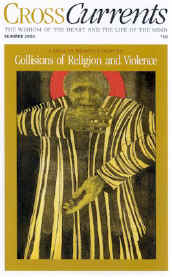Bible | Movies | Books | People | Hot Topics | Holidays | Humor | Gallery | Sanctuary | Sermons | Prayer | Quizzes | Communities | God | FAQ | Links
|
Sponsored Link |
While Biblical literalists and fundamentalists don't appear to have a particular problem with the violence of God, assuming as many do, that God's wrath will not be aimed in their direction, those of us in mainline and liberal traditions do. There is something in us that recoils against the idea of God raining destruction down upon entire populations or directing a "chosen people" to wage war against entire nations. In this light, the plagues that eliminated all the first born male children in Egypt just prior to the Exodus seem out of character with the "just and loving God" we have learned to know and love. Likewise, the idea that God would condemn entire populations to an eternity in hell simply because they did not profess faith in Jesus Christ seems manifestly unjust. In the same context, it is difficult for us to understand how God can permit human beings to slaughter each other by the millions as happens in time of war, or how the same God can permit disease and natural disaster to wipe out additional millions of people whose only fault seems to have been that they were born in the wrong place at the wrong time. How can a just and loving God permit such violence to continue? Likewise, while we are not very comfortable about it, many of us recognize that religions generally, and Christianity in particular, all too often factor in the most serious situations of conflict within the human family. Indeed, in places like the Middle East, Northern Ireland, India, Pakistan, etc., religion continues to be a major cause of persistent antagonisms between entire populations. In a groundbreaking, special issue of CrossCurrents, the editors assembled a collection of articles that take a fresh look at the relationship between religion and violence, exploring a question that has been taboo in many religious communities: if God is capable not only of permitting, but actually promulgating violence, are we driven to the conclusion that there is something violent and abusive in the very nature of God? In the lead article, "Violence in Christian Theology," J. Denny Weaver finds in the central Christian doctrine of the atonement a major source of the problem. For despite the fact that Jesus renounced violence and urged his disciples to follow his own example of nonviolent resistance to evil, the early church adopted a view of Christ's saving work that provided a convenient pretext for later generations of Christians to justify the sorts of behavior that Jesus specifically condemned. Indeed, Weaver argues, by promoting the idea that God not only permitted but also somehow "required" the death of his own Son, Christianity inadvertently presented to the world an image of God as an abusive parent. It was this element of traditional Christian theology that was waiting like a time bomb for later generations of Christians to pick up when they needed a convenient justification for using military force against their neighbors, as Christian leaders since the days of the Emperor Constantine have been all too ready to do. Weaver's analysis also goes a long way toward explaining how it is that a majority of Christians in the United States today persist so passionately in supporting capital punishment even though the founder of their own faith was himself a victim of the unjust administration of the death penalty. Weaver concludes his article by suggesting a practical program for the reshaping of Christian theology and Christian ethics so as to address the problems he identifies. Other writers in this collection define the problem in ways that make it even more resistant to solutions. For example, David Blumenthal is the author of Facing the Abusing God (1993) which suggested that Christians and Jews alike must understand God alternately (not simultaneously) as abusive parent and as object of trust and worship. Needless to say, this suggestion was not universally praised. One of those who had difficulty with the notion of an abusive God was one of Blumenthal's graduate students, Julie Shoshana Pfau. She initiated a long correspondence with Blumenthal in which she wrestles with the question of whether one can appropriately worship a deity who is both violent and abusive. This exchange of letters between two people of faith wrestling with one of the most difficult and perplexing questions of all makes for fascinating reading. Rather than ending with a solution to the problem or an answer to the questions they raise, Blumenthal and Pfau exemplify the importance and value of wrestling with questions of doubt and faith, even feelings of anger and resentment toward God, at a deeper level of honesty than most of us are accustomed to. Warning! These articles are not easy; they are not written to make you feel comfortable or to put to rest nagging doubts or disturbing questions. But if you are interested in wrestling with the tremendous question of God at a deeper level, you may find them well worth the investment of time necessary to read them. Further, you are invited to return to this site's forum to share your own thoughts about the Violence of God. Articles in the series, available online:
Editorial: The Image on Impact Is Religion Both the Cause and the Cure of Violence?
Please take a moment to let us know you
were here!
If you want to talk with someone in person, please feel free to call 917-439-2305
The Rev. Charles P. Henderson is a Presbyterian minister and is the author of God and Science (John Knox Press, 1986). Charles also tracks the boundry between the virtual and the real at his blog: Next World Design, focusing on the mediation of art, science and spirituality in the metaverse. For more information about Charles Henderson. |
Sponsored Link
|


